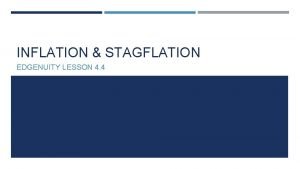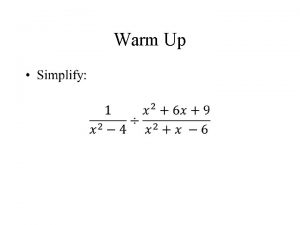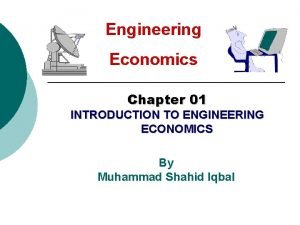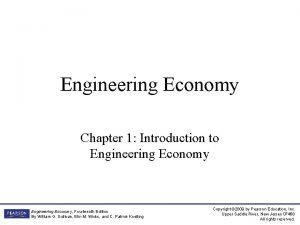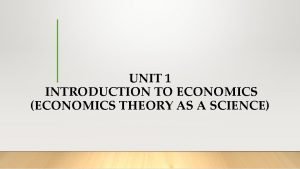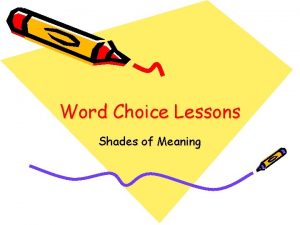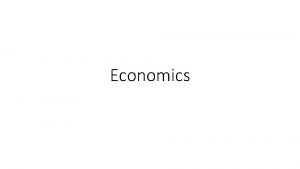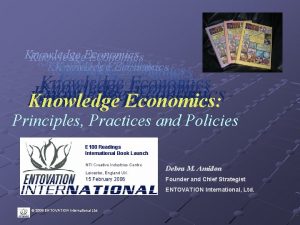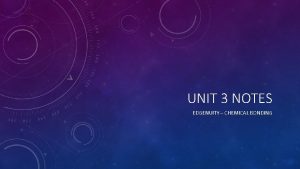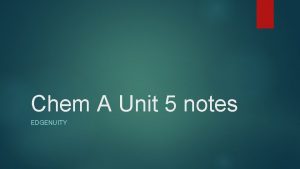INTRODUCTION TO ECONOMICS EDGENUITY LESSONS 1 1 1

















- Slides: 17

INTRODUCTION TO ECONOMICS EDGENUITY LESSONS 1. 1 & 1. 3 SPRING SEMESTER 2019 STATER

What are resources? Anything used to make goods and services 3 major types: Land – things found in nature Example? Labor – effort and skills of people Example? Capital – money or assets used to make money (machinery, buildings, etc. ) Example?

Renewable vs. Nonrenewable Resources What’s the difference? One can be replaced while the other cannot Examples? What percentage of energy used in the U. S. do you think is renewable? About 9% and rising

The idea that all resources are limited is known as… Scarcity! But people’s needs/wants are unlimited, therefore… People and economies must make choices: How should we allocate resources?

What makes a resource valuable? Scarcity! The more scarce a resource is, the more valuable it likely is How would using scarce resources to produce a product affect the price of that product?

QUICK QUIZ What determines the value of an item? a. the amount of goods that are produced b. the capital required to build the factory c. the unlimited wants of the consumers d. the resources consumed in production

QUICK QUIZ What are the 3 major types of resources? Land Labor Capital

QUICK QUIZ Which of the following uses a nonrenewable energy source? a. a wind mill b. a power plant c. a fruit orchard d. a swimming pool

The 3 Economic Questions Whole economies and individual producers must answer these

1. WHAT SHOULD BE PRODUCED? Consider people’s needs & wants Availability of resources Plan how to use resources

2. WHO SHOULD RECEIVE THE PRODUCT? Consider who has the greatest need Understand who has authority Identify who has greatest ability to pay

3. HOW SHOULD THE GOODS AND SERVICES BE CREATED? Consider how: Things have traditionally been made To produce items at a lower cost or higher quality To make the biggest profit

Factors of Production: Another name for resources Land is limited by: Type Amount

Labor is limited by: Population Standard of living Education Geography Capital is limited by: The $ available to invest in production Limited physical resources

ECONOMIES ALSO HAVE TO CONSIDER… How to benefit society as a whole. If the 3 questions are left unanswered: Depletion of scarce resources Unmet needs of citizens No economic growth

QUICK QUIZ What is another name for resources? Factors of production What are the 3 economic questions? What to produce, who should receive it, how to produce it

QUICK QUIZ Which of the following will be accomplished by efficient allocations of the factors of production? a. ensuring economic profitability b. understanding whether a product will fail c. fulfilling many needs and wants of society d. replenishment of limited resources
 School of business and economics maastricht
School of business and economics maastricht Mathematical economics vs non mathematical economics
Mathematical economics vs non mathematical economics Typically, high inflation is a sign of
Typically, high inflation is a sign of Blackboard learn tuhsd
Blackboard learn tuhsd Function operations multiplication
Function operations multiplication Edgenuity epic poetry gilgamesh answers
Edgenuity epic poetry gilgamesh answers Edgenuity hcps
Edgenuity hcps Svsd edgenuity
Svsd edgenuity Adding and subtracting rational fractions
Adding and subtracting rational fractions Is a trapezoid a kite
Is a trapezoid a kite Seaford high school schoology
Seaford high school schoology Introduction to economics
Introduction to economics Scope of engineering economics
Scope of engineering economics Unit 1 economics
Unit 1 economics Introduction to engineering economics
Introduction to engineering economics Unit 1 introduction to economics
Unit 1 introduction to economics Word choice lessons
Word choice lessons Diction definition literature
Diction definition literature


